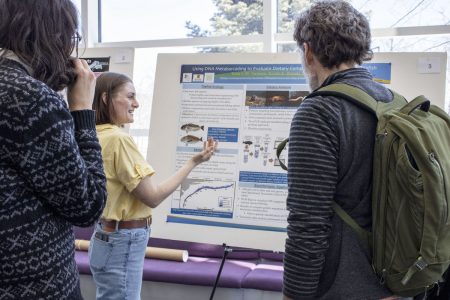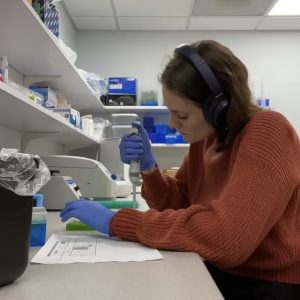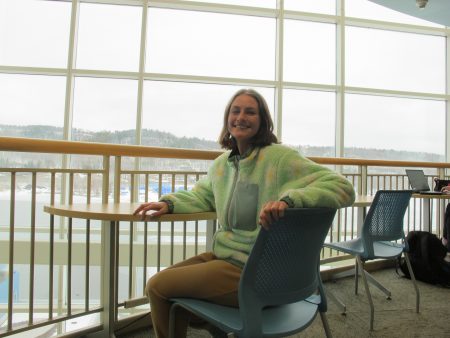Tessa Tormoen is a fourth-year student majoring in ecology and evolutionary biology with a minor in fish biology. She is one of the most adventurous people you’ll ever meet. You can often find her cross-country skiing on the Swedetown and Tech Trails. Not only is she a fan of heart-racing adventures, but her curiosity has also led to her getting involved in undergraduate research. Throughout Tessa’s classes, she learned the basic skills and processes needed in the lab. Her confidence grew. She was ready to put these skills into practice and take on an independent project. In the fall of 2021, she discussed her interest with Dr. Kristin Brzeski, assistant professor at Michigan Tech.
Fishing for DNA
Dr. Brzeski put Tessa to work observing Golden and Blueline Tilefish. She extracted DNA from the digestive tracts of predator fish and constructed what the taxonomic group looks like by using a method called Metabarcoding, which is a process of DNA sequencing and identification. Using this technique she was able to characterize the dietary composition of the two different tilefish species to better determine the species’ niche breadth (or use of food resources in this case) and degree of similarity. This is one factor showing how the two species co-exist.
Like any craft, it’s a continual learning process. Working alongside graduate students and mentors, she developed her independent problem-solving and management technique. Learning the ins and outs of research was a steep learning curve, but Tessa was able to gain valuable skills and knowledge during her time as a researcher. “It’s a joy to have an undergraduate like Tessa in the lab. She brings passion, intelligence, and a genuine interest in research and natural resource conservation to every interaction,” said Dr. Brzeski.
Tessa exhibited her research at the 2023 Undergraduate Research Symposium, winning the third place GLRC award. She also won a merit award at the Ecosystem Science Center poster session. And she presented her findings at the Wildlife Society National Conference in Spokane, Washington with others in her lab.

A Close-Net-Bunch
Tessa believes that her experiences in research have helped shape the future for the better. “I’m a lucky person. I’ve had an incredible four years. Jill Olin and Kristin Brzeski [have] built me into an independent scientist. They taught me how to solve problems, how to be independent and confident in my abilities,” she says. She credits both graduate and undergraduate colleagues in the lab with perpetuating the culture Drs Brzeski and Olin cultivated. “It was a welcoming and hopeful atmosphere.”
That feeling extends to the department. “Everyone is extremely kind, no matter who you talk to! All of my professors throughout my coursework have been very approachable and extremely passionate about what they study. I love that the biological sciences department is so personal and you can build relationships with the faculty. It truly makes the department’s environment so incredible. The support I have received from my advisor and my professors has been a valuable part of my education. I also love how the biological sciences department is a bit smaller compared to other departments like engineering. Each semester I recognize many familiar faces. I’ve been able to create great relationships with my peers through this,” Tessa said.
The Water is Just Right at Michigan Tech
Like many before her, Tessa chose to study ecology and evolutionary biology at Michigan Tech because she fell in love with this area. “I realized that I have a passion for understanding the world around me and this is a beautiful place to do that,” she said. “Plus, the experiences you’re able to have in this degree are fantastic, and I was compelled by the sheer amount of opportunities available to me.”
Tessa appreciated the flexibility the ecology and evolutionary biology degree program offered. “A lot of the coursework is electives that you get to choose from, so you can tailor your education to what you are most interested in. Thus, I was able to take courses like Mammalogy, Tropical Island Biology, Valuing the Great Lakes, Botany, and more!” Tessa said. “Sometimes you get to go outside for classes; one of my biggest memories from my degree is my Tropical Island Biology course, where we stayed in the Bahamas over Spring Break. This degree program has given me such a strong foundation and a whole list of interests that I can build upon with secondary education and post-education work experience.”
In addition to research and the degree program, Tessa took advantage of other opportunities on campus. She served as vice president of the Ski and Snowboard Club. Tessa also coordinated activities as part of the Women’s Leadership Council.
Leaving the School: Tessa’s Post-Graduation Plan
Following commencement this month, Tessa plans to “go with the flow.” This summer, you’ll find her on Isle Royale working as a fisheries technician, performing limnological assessments and fish surveys on their inland lakes. “I’m excited about this opportunity as it honestly feels like a dream job,” she said.
After taking one year to work in the field and gain more experience, Tessa wants to return to school for her master’s degree and potentially a Ph.D. “I think my experience at Michigan Tech has helped me greatly in understanding the opportunities available to me after graduation. I think that my education, research experience, and relationships at Tech have set me up for success once I leave,” she said.
We are certain her future will go swimmingly well!

